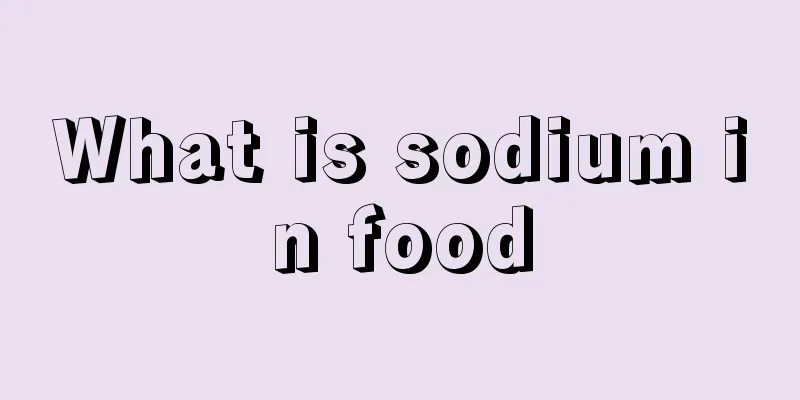What is sodium in food

|
As we all know, when we eat some snacks, many chemical additives are added to them. Some of these additives are to keep the food fresh, some are to extend the shelf life of the food, and some are to prevent the food from corrosion. However, these food additives contain certain chemical elements, which are not good for our body. So what does sodium in food refer to? What is Sodium Sodium and potassium are elements that were discovered at the same time, and both are essential substances for normal growth and development. Sodium allows calcium (calcium foods) and other minerals to dissolve in the blood and is closely related to metabolism. Since sodium is widely present in food, there is almost no need to worry about insufficient sodium intake, which will lead to high blood pressure (blood pressure foods); in addition, sodium will also be lost when you sweat a lot during summer exercise (sports foods). Sodium in the diet is mainly found in table salt, which is an important seasoning in cooking and the most important substance to ensure the body's water balance. Without table salt, human survival will be hindered. Salt plays an important role in preventing food spoilage, and sodium is an indispensable component of salt. The role of sodium in the human body Sodium is the most essential electrolyte in the human body. The total amount of sodium exchanged by a normal human body is 37-41mmol/kg, most of which is in the extracellular fluid and bones. Sodium ion is the main cation in extracellular fluid, and only about 10% exists in intracellular fluid. It is the main ion regulating the osmotic pressure and volume of body fluids. Sodium constitutes the osmotic pressure of the extracellular fluid, works together with potassium, participates in the physiological processes of cells, and is the power source for nutrients to enter and exit cells. People call this power the "sodium pump." It is this effect that drives the active movement of sodium and potassium ions and maintains the concentration gradient of sodium and potassium ions, thereby maintaining the osmotic pressure balance of intracellular and extracellular fluids, the electrophysiology of human cells, the permeability and potential difference of cell membranes, and preventing the cell membrane from being damaged. In summary, the effects of sodium on the human body are mainly reflected in the following aspects: 1. Sodium is the main positively charged ion in the extracellular fluid. It participates in water metabolism and ensures the balance of water in the body. 2. Maintain the balance of acid and alkali in the body. 3. It is a component of pancreatic juice, bile, sweat and tears. 4. Participate in the regulation of cardiac muscle and nerve function. Foods High in Sodium |
>>: What organ is the appendix
Recommend
Can I eat pig's trotters after abortion
Nowadays, people are becoming more and more open-...
What tests should be done for bladder cancer
Bladder cancer is a very harmful disease. Underst...
What are the final symptoms of advanced lung cancer lymph node metastasis?
What are the final symptoms of advanced lung canc...
How to choose bb cream
Nowadays, most women pay more and more attention ...
What are the symptoms of benign melanoma?
At present, the occurrence of melanoma can cause ...
What are the causes of lung cancer?
Lung cancer is a malignant tumor with a high mort...
What are pancreatic b cells
What are pancreatic b cells? This is something ma...
How to preserve overnight meals and how to store overnight meals correctly
Overnight meals can cause some harm to our bodies...
What are the precautions before and after gastroscopy
Gastroscopy is a relatively common method of exam...
How to treat female rectal cancer
I believe everyone is familiar with rectal cancer...
List of common medicines in the home medicine cabinet
Nowadays, people have some emergency medical supp...
The difference between concealer and liquid foundation
Concealer can be used as a kind of liquid foundat...
What to do if you have poor psychological endurance
We all know that everyone's psychological end...
Is abdominal bloating and farting a sign of colon cancer?
Flatulence and farting are not necessarily indica...
Is tongue cancer contagious? What are the common symptoms of tongue cancer?
Tongue cancer is not contagious, and its occurren...









